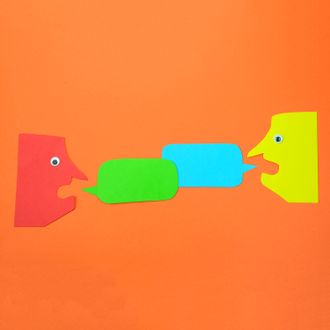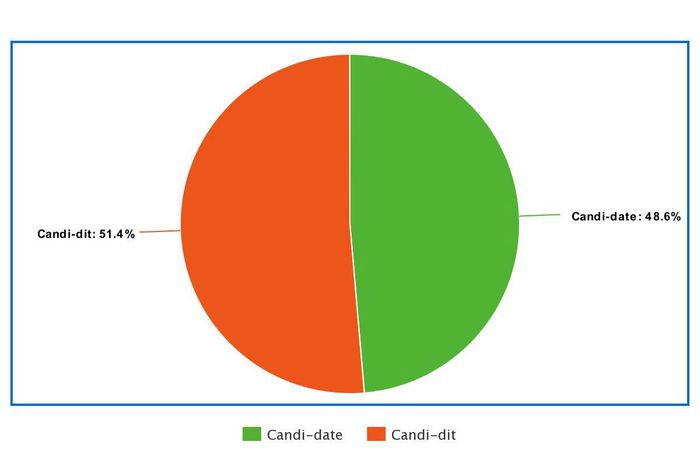
One recent morning on NPR, national political correspondent Mara Liasson and a local Maine host were discussing the then-upcoming Democratic debate. Each was pronouncing the word candidate differently: Liasson drew the end of the word out, saying “candi-date,” while the host condensed the end of the word, saying “candi-dit.” Officially, both pronunciations are correct, but this difference has always stood out to me and their exchange made me want to find out the reason behind it.
I wondered if the discrepancy was due to regional differences or something else entirely. I’m from Massachusetts, but my hometown friends and I pronounce it both ways. The colleagues I polled say it both ways too. In random YouTube videos in which people say “candidate” (185 out of 9,793 available via YouGlish), it was pretty much split down the middle: 51.4 percent (95) said “candi-dit” and 48.6 percent (90) said “candi-date.”
Here’s how the current candidates themselves (and other notable figures) pronounce the word:
“Candi-date”: Donald Trump (5:18), Barack Obama (5:00), Bernie Sanders (1:30), Joe Biden (0:13), Hillary Clinton (6:25), Sally Ride (23:25), Timothy Geithner (24:08), Ben Carson (1:04:54).
“Candi-dit”: Elizabeth Warren (5:38), Michelle Obama (3:30), Kamala Harris (20:43), Pete Buttigieg (2:50), Justin Trudeau (1:33), Bill Clinton (9:45) Paul Ryan (6:35), Sean Penn (6:32), Newt Gingrich (6:15), Gavin Newsom (6:42), Tom Brokaw (13:42), Matthew McConaughey (12:05), Lester Holt (1:20).
The more I watched, the less I could predict who was going to say it how.
Stumped, I got in touch with Bert Vaux, a Cambridge linguist and one half of the team, along with Scott Golder, behind the Harvard Dialect Survey, which polled people around the country on pronunciation and word preferences (pop/soda/soft drink, etc.).
“Pretentiousness and Britishness may come into the mix,” Vaux told me. I perked up. The crux of the issue in grammatical terms, he explained, is that the word candidate (and, similarly, the word template) is being pronounced either with something called a “schwa” — the term for condensing a syllable (as in “candi-dit”) — or with something called a “face vowel,” the term for drawing an A out, as in the way face is pronounced (also “candi-date”). (Other words with the schwa include accurate, barbiturate, and climate. Other words with the face vowel include sublimate, cremate, and primate.)
Vaux said there were no known phonological explanations for the different pronunciations of candidate — that is, it’s not physically easier to say one version with a particular accent or dialect. A sociolinguistic explanation is more likely, namely that it’s a word we pronounce based on whom we want to sound like and how we want to be perceived. And while the reasons we make this choice are ultimately a mystery, Vaux said, his best guess is that it comes down to how people feel about Britishness, even subconsciously. (Or how the area we grew up in generally thinks of Britishness.)
Although there are exceptions, British speakers typically use more condensed-syllable schwas (like “candi-dit”), Vaux said, so one’s choice of using schwas may vaguely reflect one’s feelings about Britishness. Do we generally think of Britishness positively — as emblematic of “education and sophistication,” as Vaux put it — or negatively, as emblematic of “pretentiousness and evil movie villainy,” for instance?
Vaux added that although there isn’t any good data on regional differences in the pronunciation of candidate (the word doesn’t yet appear in the Dictionary of American Regional English), he guessed that more people in eastern New England or the Northeast more generally would say the schwa variants (“candi-dit,” “temp-lit”), since it’s the part of the country “with the most cultural ties to England.”
He guessed that I pronounce it “candi-dit,” which I do. He pronounces it the other way — “candi-date” — which he credited to growing up outside Chicago, though he is originally from Houston. (He also noted that he skips the first D, making his pronunciation more like “canna-date.” In their original survey, Vaux and Golder did in fact collect data on how people pronounce candidate but only on the question of whether they pronounce the first D.)
Given that “candi-date” is theoretically the more American (or at least the less British) way of saying the word, it may bode well for Biden and Sanders, since the other leading Democratic candidates pronounce it the other way. (Trump and Obama also say “candi-date” but not Bill Clinton, and I haven’t yet figured out how George W. Bush says it.)
I like the idea that our pronunciation of certain words can betray subconscious truths about ourselves. Something like inadvertent shibboleths — like words whose pronunciation can indicate membership in a certain group, so you can tell New Yorkers from tourists sometimes by the way they pronounce Houston Street. In the case of candidate, it’s fun (dangerous? idiotic?) to think that the way we say the word may reveal our subconsciously Anglophile, therefore traitorous, hearts. Long live the queen.





